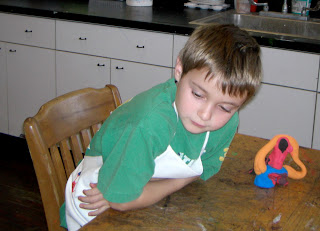"what do you think it feels like to be in space?"
"when we say the body is an object, what do we mean by that?"
"what does a detective do?"
...as students gather around the table in the high school studio, on the big pink rug in the preschool, in the morning briefing at the bi-focal detective agency headquarters, and in many other configurations on this Saturday morning--the students squirm in their seats as they wrestle with our questions. The hamster is really running at this point, breaking all kinds of records!
Jaxson begins to fidget in his place, leaning toward the teacher with his entire body shaking with excitement...eventually muscling out of his mouth, "it...it...fee"...but another question has emerged. Jaxson falls back on his bottom, defeated! As students in the high school begin to think about their own bodies as objects, conjuring up imagery that best reflects this particular line of inquiry, there is an immediate re-directing of the question toward the artist of the day. In the bi-focal briefing room, the detectives are quickly constructing descriptions of what a detective does, but those descriptions are only partially revealed today...another question has come to fruition.
Though our first day with students was a great success, there are many places that we might begin to look more intricately at, to take a second look...and, to take a few extra seconds...to listen. Our questions are important, but the capacity to which our students respond should have precedence in our teaching. Our students are vigorously working to provide us with their interests, curiosities, concerns, convictions, and resistant tendencies. Are we listening? Do we see these often mute exchanges? How can we become more sensitive to our own presence in the act of talking with students? How can we become sensitive to those moments where "waiting just a few more seconds" elicits a flurry of debate? Our students have incredible stories to share with us, and our questions are often the catalyst for their narrative impulse.
I have three questions for each of you today, questions that I feel might help us to become awakened to these aspects of the teacher-learning relationship: (1) What is wait time? (2) How might this be useful in our teaching this semester? (3) How does "wait time" reflect the degree to which we are engaged in "being there" with our students?











